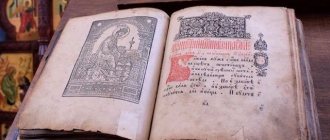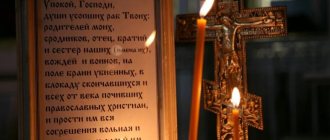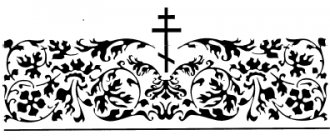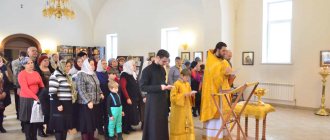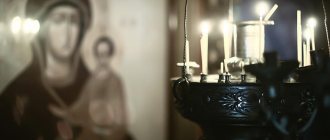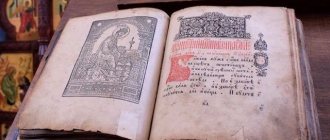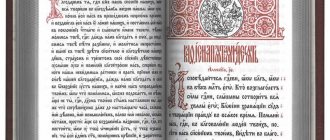The Psalter is the 3rd section of the Old Testament canon of the Bible. It consists of 150 prayerful, laudatory, and penitential psalms.
The Holy Book takes its name from the Greek word Psalterion, which means the name of a musical instrument. Playing it was accompanied by prayer chants of psalms.
The Psalter was created as a collection of prayers for every day and for all occasions. The only book of the Old Testament that is fully included in the worship of the Orthodox Church.
Evening and morning services, liturgy (first and final parts), various hymns, canons, stichera, all this is built on the motifs of the psalms: on praise, on repentance, on gratitude to the Lord.
Psalter 17th century. Published from October 20 to December 6, 1646. Full-page engraved image of King David. Old Church Slavonic text
Each psalm is a reproduction of the mental state that the poets experienced under different circumstances. Due to the diversity of the content of the psalms, they always find reflection in the soul of the person praying.
The Psalms of David are a person’s appeal to God.
The Psalter was written more than three thousand years ago before the birth of Christ and was created over almost a thousand years. At the beginning of the psalm there are instructions and precise instructions:
- who is the author, if any;
- when it needs to be performed, on a holiday, or at dawn, in the morning;
- what accompaniment should accompany this prayer.
Ancient people always treated the book of Psalms with special reverence and respect. As Saint Athanasius the Great said:
“The Psalter is the Bible in one book.”
Afanasy
saint
It contains everything - from the creation of the world to the Last Judgment, God's providence. The Psalter is a book of prayer for every day; this is its main difference from other books of Holy Scripture.
Psalms of David - a collection of hymns and prayers that are read during worship
The Psalter is a collection of psalms, the authors of which were King David, Moses, Solomon, Heman, Etham the son of Korah, Asaph and his Asaphite descendants.
The remaining psalms belong to unknown authors. Why is the Psalter called the psalms of David, since he was not the only compiler of prayers included in the Holy Book?
80 psalms
wrote King David
The beginning of the book of Psalms was laid by King David; he authored about 80 psalms.
Distinguished by their unprecedented poetic beauty and depth of spiritual feeling, the psalms of King David inspired subsequent authors to imitate them.
He was also the first to begin performing psalms while playing a musical instrument called the psaltyrion. It is for these reasons that the Psalter is also rightly called the Psalms of David.
King David. Born 1000 BC. Reigned for 40 years. Laid the beginning of the Psalter, author of most psalms
David's psalms express the emotional experiences he experienced throughout his life.
His sorrow to the Almighty, his repentance for committing sins, experiences that were associated with the betrayal of his own son, gratitude to the Lord God - he expressed all his thoughts and feelings in prayer texts.
Thanks to the gift of prayer and the inexhaustible poetic talent of King David, the content of the psalms is very close and understandable to the consciousness of every reader.
They are able to instill a sense of empathy, repentance and love in a person.
The psalms of the prophet and king David have been translated into many languages of the world. In Russian there is a Synodal translation, a Church Slavonic translation and others.
What is the Psalter and Psalms
The Psalter is one of the main Christian books, although it was written long before the birth of Christ by several authors.
Traditionally, the Old Testament prophet and king David is considered the creator of the Psalter. Although he himself in his psalms mentions “my fingers composed the Psalter” - that is, he, being both the author, recognizes himself as the compiler. However, in some psalms, other authors are specifically indicated in the text of the book itself: the first psalmist of David himself, Asaph, the temple gatekeepers, the sons of Korah (Korach), the prophet Moses, etc. The best Jewish commentator Rashi lists ten authors for the Psalms, including Jedithun, Abraham, Heman, Melchizedek, Adam, Asaph, Moses, the sons of Korah.
In some editions of the Psalter, the author also signs the psalms. In many of the psalms traces of a much later time are clearly visible, something in which David lived: these are the times of the captivity of the Jews by the Babylonians and even later.
In the next article you will become familiar with the akathist to the Holy Great Martyr George the Victorious.
The Psalter is a collective spiritual work
Most likely, the Psalter was formed gradually, like any fruit of collective creativity. However, the authors have one thing in common: they are all people who had full communication with God, were righteous in His eyes and had within themselves the constant presence of God - the Holy Spirit. That is why each psalm is a joint creation of man and God. The Psalter combines the reflection of the difficulties, problems and feelings of a believer with the presence of God.
The souls of the holy people, the authors of the psalms, were pleasing to God and He sanctified them with His presence, accompanied them and provided them with the help they needed so much at that time. Each psalm is a symbiosis of human feelings and Divine sanctification. Because God revealed His destinies to each of them and showed His deeds. Precisely because everything that is described in them, and the way each author perceived what was happening around him, is the truth.
The authors of the psalms were people of different origins - nobles with an excellent education appropriate to their time, and simple people. If David was a king and knew how to handle the word, as can be seen from his beautiful psalms, then with his other author, Moses, everything is a little different.
Moses' contribution
As you know, Moses was “humbling,” that is, he did not know how to speak beautifully and fluently (despite the fact that he was raised at court and did not have royal origin). That is why, when God called Him to serve, he several times persistently asked the Almighty to choose another for this purpose, who would be able to beautifully and clearly tell people what was required of them. To which God even became angry with Moses, making it clear that it was he who pleased Him, and not the other. And he gave Moses his brother Aaron, who was eloquent, to help him, so that he could “translate” to the people what they needed.
We mentioned above that the author of some psalms - and this is a poetic spiritual work that was performed to the accompaniment of a musical string instrument - was Moses. The same one, tongue-tied, unable to connect even a few words. His Psalm 89 is an example of spiritual and poetic creativity, in which historical events are also mentioned. Without inspiration from above, it is impossible to convey so briefly, clearly and accurately all your aspirations and praises to the Almighty, to present His deeds, to sing of His power and glory.
Psalm 89 by Moses
“Lord,” exclaims the prophet, “has been our refuge from generation to generation.” The prophet testifies that he sees the works of God; they are revealed to him by the Holy Spirit. “All our days have passed in Your wrath; we lose our years, they disappear like sound.” The prophet says that people greatly offended their Heavenly Father by believing not in Him, but in the evil serpent, who tempted Eve to eat from the forbidden tree. Therefore, people on earth in those days, until the Savior came, lived in the wrath of God.
Further, the prophet says: “Our days are seventy years, and with a special strength - eighty, and at the same time their best time is in labor and experiences, in illness, and these best years pass quickly.” And then the man of God draws a conclusion, which develops into a prayer request: “Teach us to spend our days in such a way that we can acquire a wise heart.”
This is how the Lord, with the touch of His Spirit, turns a tongue-tied person into a poet and man of prayer. Those who read and sang these words understood and felt a special, superhuman benefit for their souls and noticed that the Lord, when the words from the psalm were addressed to Him, responded especially quickly to them. After all, He himself participated in their appearance.
Holy people noticed this fact and began to resort to the Psalter, to the words of righteous people more and more often.
The Psalter is rich in variety of prayer content
Since Old Testament times, not a single divine service has been complete without the hymns of the Psalter.
Although most of the psalms have the same prayer form, their content is very diverse: thanksgiving, petitionary, penitential, laudatory, teaching, prophetic.
See also the article How to read the psalter for the deceased at home for up to 40 days
Believers, wanting to pray “strongly,” always read the psalter. Because there is no brighter prayer, no more powerful words than those words contained in the Psalter.
Cathedral reading of the Psalter with general commemoration
Psalms of praise to the Almighty:
“Lord, our God! how majestic is Your name throughout the whole earth! Your glory extends above the heavens!”
(Ps. 8:2)
Psalms of thanksgiving:
“Blessed be the Lord, for He has heard the voice of my supplications.”
(Ps. 27:6)
The Psalter contains a large number of prayers of repentance. Psalm 50 is an example of a prayer of repentance for a sinful person:
“Have mercy on me, O God, according to Your great mercy, and according to the multitude of Your compassions blot out my iniquities. Wash me often from my iniquity, and cleanse me from my sin, for I am aware of my iniquities, and my sin is always before me.”
(Ps. 50:3-4)
Most psalms are used as edifying and instructive prayers:
“Blessed is the man who does not walk in the counsel of the wicked, and does not stand in the way of sinners, and does not sit in the seat of the wicked, but his will is in the law of the Lord, and on His law he meditates day and night!”
(Ps. 1:1)
Prophetic psalms, the text of which, through prototypes, says a lot about Jesus Christ and his crucifixion:
“For dogs have surrounded me; a crowd of evildoers has surrounded me; they have pierced my hands and my feet. One could count all my bones; and they look and make a spectacle out of me; They divide my garments among themselves and cast lots for my clothing.”
(Ps. 21:17-19)
The Psalms of David are an exemplary form of sublime, heartfelt, reverent prayer.
When the Psalter is read
Without exaggeration, we can say that you can always read it. This collection contains such depth and wisdom of our predecessors, such a colossal experience of life on earth with God, that there is literally not a single topic to which the words of the psalms would not be suitable. We can briefly outline some situations when people resorted to the Psalter:
- when possessed by unclean spirits (before the coming of Christ, this was the only book by which one could reprimand the possessed and drive out the unclean spirit from him);
- during persecution and troubles;
- for illnesses;
- while traveling;
- in wartime;
- for well-being in the home;
- if you need help in protecting children;
- to clarify the situation;
- when you are at a loss as to what to do.
In a word - always. Some saints made notes on the psalms, when and in what situation the Lord helped thanks to prayer with one or another psalm, for example, “may the bolt be opened,” “may the lost key be found.”
The Lord rushes to help even when a person calls out to him even with a line from a psalm. This is a proven fact: the angry authorities soften or do not fulfill their formidable promises if a Christian prays to God with the words “Remember, O God, David and all his meekness.” Despite the fact that the name David may not be the name of the one praying, and, to his shame, he does not possess meekness, nevertheless the Lord remembers His man - King David - and helps those who ask for help, protection and mercy to yourself or loved ones.
Kathisma is a liturgical section of the book of Psalms, during which you can sit while reading
New believers often ask the question: “Is it possible to read the Psalter while sitting?” The tradition of sitting and singing psalms arose many years ago, when clergy tried to read the entire Psalter per day.
Kathismas served and continue to serve as a short rest for worshipers.
Kathisma
translated from Greek means to sit
The Holy Book identifies 20 kathismas of approximately equal length, each of which is read separately during the service and contains a different number of psalms. The largest number of psalms contains 18 kathismas.
It includes 15 psalms (P. 119 - 133). The smallest number - one psalm 118 contains 17 kathismas.
In turn, each kathisma is divided into three parts, called articles (Greek στάσις - chapter, subsection) or glory. The name glory comes from doxology.
Reading the book of Psalms is a centuries-old tradition.
It is based on a whole set of rules. According to the Charter, during the service all 20 kathismas are read in full during the week.
On the eve of Great Church holidays, kathismas are not read at Vespers, the exceptions being Saturday evening, when the 1st kathisma is read, and Sunday evening, when the 1st article of the 1st kathisma is read.
See also the article Is it possible to read an akathist while sitting?
During Lent - twice a week. A kathisma prescribed for reading on a certain day according to the charter is called an Ordinary kathisma.
Kathismas are a special type of psalmody, the performance of which occurs with the least solemnity, in a calm sitting position. This is a kind of rest for the soul and body of those praying.
Psalms for all occasions: which ones to read under what circumstances
Probably each of us in childhood dreamed of a magic wand. How cool it would be: he waved, and help immediately arrived. Our ancestors also dreamed of help, whose lives were filled with dangers, illnesses and sorrows, oppression and suffering, perhaps much greater than those encountered in the lives of our contemporaries.
Now everything is much simpler, but not in the life of true Christians. The people of God suffer attacks from people, from evil spirits, waging war with the devil and his minions. Every believer clearly sees that, especially if he clearly professes his faith, he has to suffer a lot for it: in everyday life, in his personal life, while traveling, at work, in society, etc. If he secretly professes his faith, then demons create obstacles in other ways.
But Christ, on the day of his ascension into heaven, promised the disciples who were worried that they were left alone: “I am with you always.” And every true believer knows that He does not abandon anyone who believes in Him and calls for help. One of the main “lifesavers” of any Christian for literally any occasion is a treasure for his spiritual life, a collection of prayers and psalms - the Psalter.
You can read the Psalter at home with the permission of the priest and subject to special rules
Reading the Psalter is also permitted at home, subject to certain rules. Before starting prayer, it is advisable to receive the priest’s blessing.
At home, the Psalter is read with a lit candle, preferably out loud, but quietly
Rules that must be followed when reading the Psalter at home:
- The correct placement of stress is important, it is necessary to understand the meaning of what you read, to know how to read correctly. After all, a mistake made can lead not only to a distortion of the meaning of one word, but of an entire text, which will be considered a sin. Before reading the prayer, you should read the interpretation of the psalms;
- You are allowed to sit while reading the Holy Book. Only when “Glory” is read is it necessary to stand during the reading of the initial and final prayers. Reading should be monotonous, without intonation;
- during home readings, it is necessary to recite psalms about health and for the departed;
- there is no need to read the titles of the psalms;
- There is no need to be discouraged or embarrassed if what you read is not particularly understood. With our spiritual development, the deep meaning of the psalms will be revealed.
The Psalter is a conversation between a believing soul and God. When it is read, following the prescribed rules, the prayer appeal will certainly be heard.
Other recommendations
In liturgical publications, the Psalter consists of special parts called kathismas. Each of which, in turn, is divided by Glories: parts during which prayer takes place for the deceased, and prayer for the health of living people.
Before the reading of the Psalter begins and after its completion, special prayers are said, which, like troparia, are also required to be said after the completion of each kathisma.
Another important question on this topic is as follows: “How to read the Psalter correctly at home: out loud or silently?” Priest Vladimir Shlykov answers this question as follows. He says that reading this sacred text can also be done silently. However, many holy fathers recommended, if possible, to try to do this out loud. For example, St. Ignatius speaks of the benefits of saying psalms.
He writes that reading aloud accustoms a person to attentive prayer and increases understanding of the text.
Before reading the psalter, it is necessary to say preliminary prayers
Quite often the human soul is restless and simply cannot penetrate the texts of the psalms.
Therefore, to create the right mood, the right mood, it is strongly recommended to read the initial Orthodox prayers.
Prayers before reading the psalter:
“Through the prayers of the saints, our fathers, Lord Jesus Christ our God, have mercy on us. Amen. Glory to Thee, Our God, Glory to Thee!”
Trisagion
“Holy God, Holy Mighty, Holy Immortal, have mercy on us. (Read three times) Glory to the Father and the Son and the Holy Spirit, now and ever and unto ages of ages. Amen"
Prayer to the Most Holy Trinity
“Most Holy Trinity, have mercy on us; Lord, cleanse our sins; Master, forgive our iniquities; Holy One, visit and heal our infirmities, for Thy name’s sake.”
Lord have mercy (Thrice)
“Glory to the Father and the Son and the Holy Spirit, now and ever and unto ages of ages. Amen."
Lord's Prayer
“Our Father, who art in heaven! Hallowed be Thy name, Thy kingdom come, Thy will be done, as it is in heaven and on earth. Give us this day our daily bread; and forgive us our debts, just as we forgive our debtors; and do not lead us into temptation, but deliver us from the evil one.”
This Troparion, tone 6:
“Have mercy on us, Lord, have mercy on us, bewildered by any answer, we offer this prayer to You as the Master of sins: have mercy on us. "
Glory:
“The honor of Thy prophet, O Lord, is a triumph, Heaven shows the Church, the Angels rejoice with men. By your prayers, O Christ God, guide our belly in peace, so that we may sing to You: Alleluia.”
And now:
“My many and many sins, Mother of God, have come to You, O Pure One, demanding salvation: visit my weak soul and pray to Your Son and our God to grant me forgiveness for the evil deeds, O Blessed One.”
The same prayer to the Holy Life-Giving Trinity:
“All-Holy Trinity, God and Creator of the whole world, hasten and direct my heart, begin with reason and finish good deeds inspired by God and books,
Even though the Holy Spirit will regurgitate the mouth of David, which now I want to speak, I, unworthy, understanding my ignorance, I pray to You,
and asking You for help: Lord, guide my mind and strengthen my heart,
not about the words of the lips saying cold, but about the minds of those saying to rejoice,
and prepare to do good deeds, even as I learn,
and I say: let him be enlightened by good deeds,
At the judgment of the right hand of Thy land I will be a partaker with all Thy chosen ones.
And now, Vladyka, bless, so that I sigh from my heart and sing with my tongue, saying to my soul.”
After reading the pre-reading prayers, the Psalms of David should be read slowly, quietly and thoughtfully, so that you can understand with your mind what you are reading.
By leaving a comment, you accept the user agreement
Psalter Prayers after reading several kathismas or the entire Psalter
Synodal translation
Healthy? Share the link!
After reading several kathismas or the entire Psalter:
It is truly worthy to eat / glorify You, Mother of God, / eternally blessed and immaculate / and Mother of our God. / With the highest honor of the Cherubim / and incomparably more glorious than the Seraphim, / who virginally gave birth to God the Word, / the true Mother of God - We magnify You.
Or
All creation rejoices in You, O Blessed One: / The angelic host and the human race. / You are a consecrated temple and a spiritual paradise, / the glory of virginity, from which God became incarnate and our God who existed before all ages became a Child. / For He turned Your bosom into a throne / And made Your womb wider than the heavens. / All creation rejoices in You, O Most Gracious One, / Glory to You!
Trisagion. Glory, and now: Most Holy Trinity: Lord, have mercy (3). Glory, and now: Our Father:
Troparion, tone 6
Have mercy on us, Lord, have mercy on us, / for finding no excuse for ourselves, / we, sinners, offer this prayer to you as Master: / have mercy on us.
Glory: Your Prophet, O Lord, / the sacred triumph / the Church likened to heaven: / the Angels rejoice with people. / Through His prayers, O Christ God, / guide our lives in peace, / so that we may sing to You: “Alleluia.”
And now: Countless are my many sins, Mother of God, / - I have resorted to You, Pure One, in need of salvation. / Look mercifully on my weak soul / and intercede before Your Son and our God / to grant me forgiveness for the grave sins I have committed, / O O Blessed One.
Lord, have mercy (40).
And bow as much as you want, or say the prayer of St. Ephraim the Syrian with bows, dividing it into three parts:
Lord and Master of my life, do not betray me to the spirit of idleness, vanity, lust for power and idle talk. (Bow)
Grant the spirit of chastity, humility, patience and love to me, your servant. (Bow)
Yes, Lord the King, let me see my sins and not condemn my brother, for You are blessed forever and ever. Amen. (Bow)
Also 12 small bows with prayer:
God, be merciful to me, a sinner.
And again the whole prayer: Lord and Master of my life: and one great bow.
Then say the following prayer with attention:
Most merciful and most merciful Lord and Giver of all good things, Lover of mankind and King of the entire universe, many-named Lord and Lord! I, beggar and needy, dare to call on Your wonderful, terrible, and holy name, before which all the heavenly Powers created by You tremble with fear. Below, on earth, You marvelously revealed the providence of Your ineffable love for mankind, sending Your beloved Son, Whom You gave birth from the beginningless depths of Your Fatherly glory, without being separated from Him by Divinity, so that He would unite people with Angels into one assembly. Remember, Lord, my humiliation from despondency! I, dirt and dust, call upon You, Inexpressible Light! I am clothed with the weakness of the flesh, but by His mercy Your Word accepted it and by His death freed our souls from slavery to the enemy, so that all who by faith took upon themselves the yoke of serving You might be worthy of sharing Your glory, from which the lying Satan had fallen. Have mercy on me, darkened by sinful thoughts, raise up my mind, drowned by the thorns of laziness and the thickets of disobedience. Establish my heart to burn towards You, send a source of tears to my eyes, and in the end, at the departure of my soul, make me pleasing to You without blemish, instructing me to strive diligently for Your sake. Remember, Lord, by Your mercy my parents and all my neighbors, and brothers, and friends, and neighbors, and all Orthodox Christians, and save me through the prayers of all the saints. And accept in honor these psalms and prayers that I said before You for myself, and may this prayer with sighing not be disgusting to You, for You are Merciful and Lover of Mankind, and We glorify You, the Beginningless Father, with Your Only Begotten Son and with the Holy Spirit now , and always, and forever and ever. Amen.
With the highest honor of the Cherubim and incomparably more glorious than the Seraphim, who virginally gave birth to God the Word, the true Mother of God - We magnify You.
Glory, and now: Lord, have mercy (3). Bless.
The priest pronounces the dismissal, and the layman ends like this: Lord Jesus Christ, Son of God, through the prayers of Your Most Pure Mother, by the power of the Holy and Life-giving Cross, the holy Heavenly Powers of the bodiless, our reverend and God-bearing fathers, the holy prophet David and all the saints, have mercy and save me, sinner, as Good and Lover of Humanity.
The site needs your help!
Every day more and more people come to the site molitvoslov.today. This is what it was created for: to ultimately become the most popular and complete collection of prayers, akathists, canons and images of icons in RuNet. But to develop the resource, funds are needed: annual domain renewal, payment for hosting and services for article authors. I don’t want to cover the site with advertising like a Christmas tree. Therefore, a small request to everyone who scrolled the page to this place and who liked molitvoslov.today: I will be grateful for any financial assistance for its development. Peace to you!
What is the Psalter
Prayer accompanies a Christian in all his life’s affairs and circumstances. It is no coincidence that the Orthodox prayer book contains a huge number of different prayers. They were compiled by saints in moments of special spiritual state. And a special role is occupied by the book of Psalms, mainly consisting of prayer addresses of the Old Testament king David. The Indestructible Psalter is connected with the reading of this book.
It is one of the oldest liturgical books and is often called divinely inspired. The Holy Spirit himself suggested to David the heartfelt prayers of the psalms.
“In all Holy Scripture the grace of God breathes, but in the sweet book of psalms it breathes predominantly” (St. Ambrose of Milan).
Psalter revealed on Psalm 56
Arseny of Cappadocia, “Psalms for different occasions”
The Monk Arseny turned to the psalms for blessing when there was no specially compiled church rite for a special need. Saint Arseny sorted all the psalms into several very extensive sections:
- in protection from demons;
- from elements and disasters;
- from human enmity;
- about well-being in family life and the removal of enmity among loved ones;
- about healing from illnesses;
- about help in various everyday needs;
- about the structure of relationships between people;
- to help in financial difficulties, the establishment of justice, and the strengthening of well-being;
- about the return and sending down of spiritual fruits, about deliverance from passions.
Each section contains psalms that address specific cases in more detail.
Psalm 139
This psalm was written by the Old Testament righteous man David at a moment of great sorrow due to the troubles that befell him. He was persecuted by his son Absalom, who wanted to kill his father. The young man was extremely persistent in his intention, which caused his father terrible grief. The content of the psalm is devoted almost entirely to the enemies, who do not in the least infringe upon themselves in the means to achieve the rightful throne of David.
This psalm is both a prayer and a lament to the Almighty. In it, the author conveys to God for judgment what intrigues yesterday’s like-minded people and friends are building against him and, and is horrified by the variety of their tricks. The interpretation of Psalm 139 suggests that David was most depressed by the persistence with which his enemies pursued him: he reports that literally every day they did not give him rest.
The psalmist asks the Creator to create in such a way that lies from the lips of the wicked will fall on their own heads, and the name of the righteous will be justified.
Psalm 139 should be read to families whose head greatly offends and oppresses its members, so that God will admonish and pacify him.
Psalm 22: why they read it
Let's remember modern American films. An acute moment, the hero’s life is in the balance, and he begins to cry out: “The Lord is my shepherd, I will not need anything.”
The beauty and poetry of the style, the imagery of the language, as well as the brevity of the presentation made this biblical text a true hit among filmmakers. Several poems from it were heard in many blockbusters and TV series:
- "Terminator",
- "Titanic",
- "Sin City"
- "X-Men"
- "Van Helsing",
- "The Book of Eli"
- "Mentalist" and many others. etc.
“The Lord is my shepherd...”, etc. - this is a more modern and less accurate translation of the work. In a more accurate translation, its beginning sounds like “The Lord shepherds me and will not deprive me of anything.”
The main idea of Psalm 22, regardless of its translation and what language you listen to it in, remains the following - the Heavenly Father protects and protects his children, directs their thoughts and lives towards spiritual development. Then this thought is revealed. The Almighty provides all His children with everything necessary for life. The only misfortune is that they often do not notice this, they take for granted the ability to live, to know God, and to please their loved ones.
There is also an image of danger, as well as death, in the text, which pushes blockbuster heroes to pray in the most dangerous moments of their lives with these very words. The author of the prayer is unshakably convinced that the Almighty will provide him with reliable protection, because He has all the strength and capabilities for this. Therefore, a believer experiences feelings of joy and hope, trusting in the One who holds everything in His hands.
